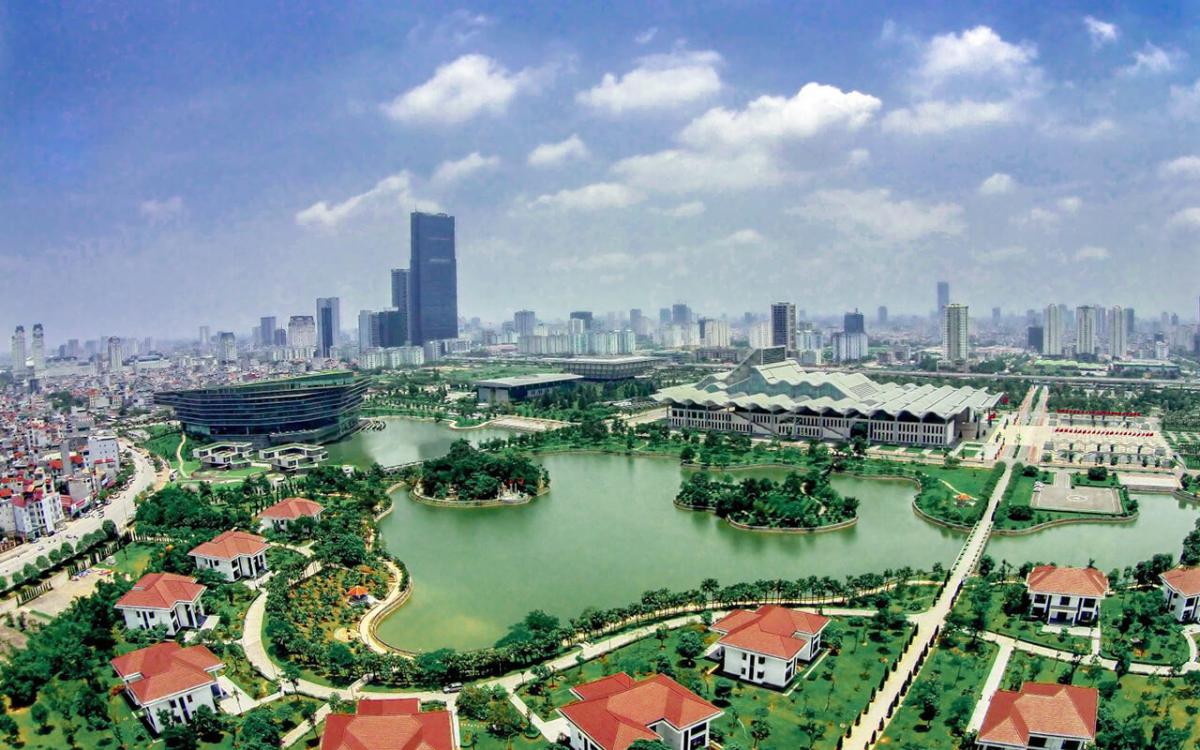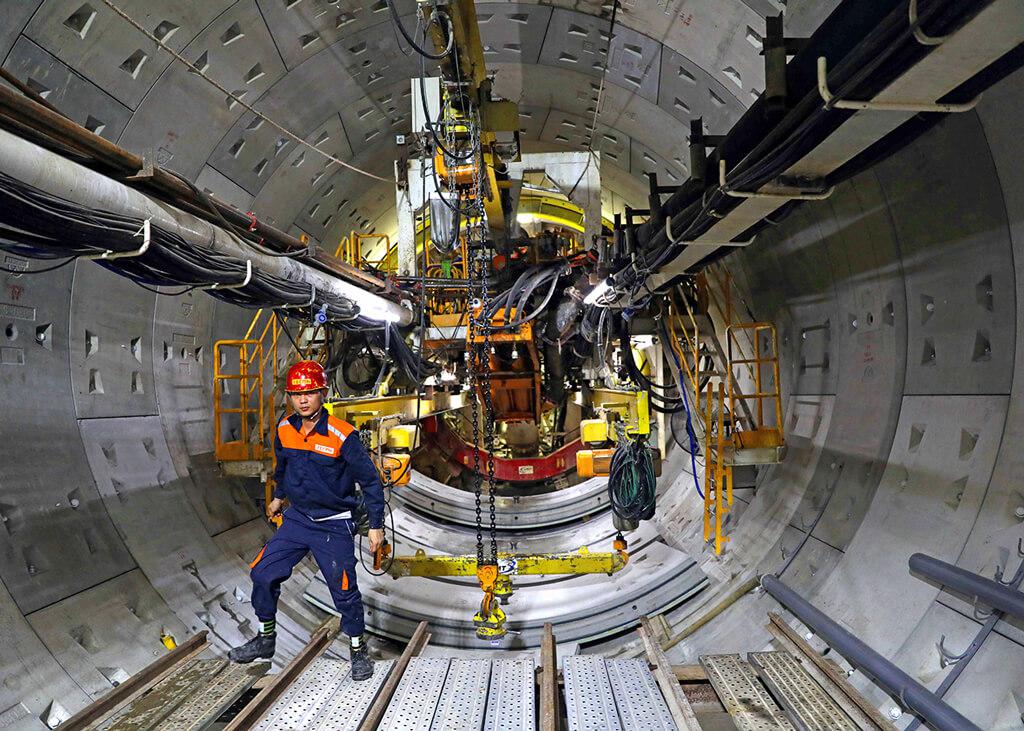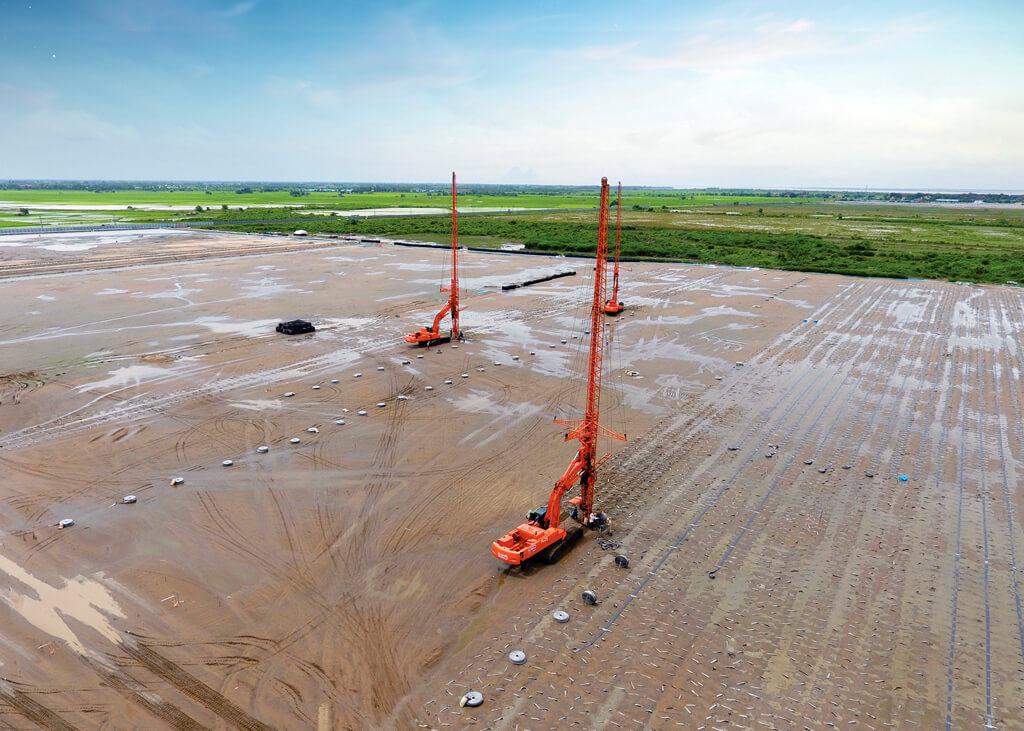INTRODUCTION
1. Policy and experience in green transformation
In the face of increasingly severe global challenges such as climate change, resource depletion, and environmental degradation, green transformation has become a pivotal global strategy to promote sustainable growth, reduce greenhouse gas emissions, and protect planetary ecosystems. From a long-term perspective, many countries have identified green transformation as an environmental necessity and a catalyst for shifting economic growth models, improving quality of life, and enhancing national competitiveness.
Within this transition, public policy plays a central role as both a regulatory instrument and a driver of systemic change. Simultaneously, practical experiences across sectors and countries serve as valuable references for developing nations like Vietnam to learn from, adapt, and tailor solutions to local conditions. However, Vietnam’s experience shows a persistent gap between policy formulation and on-the-ground implementation. This calls for more in-depth scientific inquiry to refine institutional frameworks, strengthen inter-sectoral coordination, and enhance stakeholder engagement.
Session 1 of the International Conference “Green Transformation in the Context of Global Change 2024,” hosted by the School of Interdisciplinary Sciences and Arts, Vietnam National University, Hanoi, centers on “Policy, Governance, and Experience in Green Transformation.” The session aims to analyze core policy pillars, share exemplary implementation models, and identify critical success factors that underpin effective transformation. The discussion spans diverse sectors such as green manufacturing in the chemical and agricultural industries, utility-scale solar power development, green belt and low-carbon urban planning, and sustainable port governance. Through sector-specific case studies, participating scholars and experts highlighted Vietnam’s strong commitment to achieving carbon neutrality by 2050 while underscoring the persistent challenges in policy enforcement and resource mobilization.
Accordingly, this section is the foundation for an academic forum in which scientists, policymakers, and business leaders converge to exchange perspectives, critique policy mechanisms, and propose innovative approaches. The overarching goal is to bridge the gap between theoretical constructs and practical execution, between strategy design and policy outcomes. Furthermore, the discussion contributes to shaping future interdisciplinary research agendas in green policy science, such as ex-ante and ex-post policy impact assessment, adaptive institutional design, and evidence-based policymaking in the global context of sustainable development.
2. Green transformation in the digital transformation context
Background and rationale
As the world enters the third decade of the 21st century, humanity is simultaneously confronting two megatrends that will define its future: digital transformation and green transformation. Digital transformation (DX) refers to the accelerated integration of information and communication technologies (ICT), such as artificial intelligence (AI), big data analytics, Internet of Things (IoT), and blockchain, into all sectors of economic and social life. In parallel, green transformation (GX) encompasses the systemic transition towards sustainable development by reducing greenhouse gas emissions, improving energy and resource efficiency, and fostering ecological resilience.
Although initially conceived as separate trajectories, these two processes are increasingly recognized as mutually reinforcing. On one hand, digital technologies offer powerful tools to monitor, optimize, and decarbonize economic activities. On the other hand, the goals of green transformation provide normative direction for the application and governance of digital innovations. Therefore, integrating DX and GX forms the core of the "twin transition," a paradigm that simultaneously seeks to achieve environmental sustainability and technological modernization.
Scientific and practical importance
The convergence between digital and green transformation has profound implications for science and policy. Digital technologies can enable real-time emissions monitoring, enhance circular economy logistics through blockchain-based traceability, and optimize energy consumption using machine learning algorithms. In agriculture, precision farming systems leverage satellite data and IoT sensors to reduce water and pesticide use. In energy, smart grids balance supply and demand across decentralized renewable sources. In manufacturing, Industry 4.0 technologies facilitate low-waste, energy-efficient production.
At the same time, these digital applications are not neutral. They raise important questions about data ethics, technological inclusivity, cybersecurity, and the environmental footprint of digital infrastructure itself (e.g., energy use of data centers and e-waste generation). Therefore, a sustainable digital transition must be embedded within broader ecological and social frameworks. This requires a multidimensional research agenda that spans environmental sciences, computer science, economics, and public policy.
Vietnam's context: Opportunities and challenges
Vietnam stands at a critical juncture where digital transformation is advancing rapidly across key sectors, supported by strong government commitment (e.g., National Digital Transformation Program to 2025, Vision to 2030), a vibrant startup ecosystem, and growing digital literacy among its population. Simultaneously, the country has pledged to achieve net-zero emissions by 2050, aligning with global efforts under the Paris Agreement.
The integration of digital tools into the green transition in Vietnam is not merely an option but a strategic necessity. However, significant challenges remain:
-
Fragmented policy frameworks that separate environmental governance from digital governance;
-
Uneven access to digital infrastructure, especially in rural and mountainous regions;
-
Lack of standardized metrics for evaluating the ecological impact of digital technologies;
-
Limited institutional capacity to manage complex digital-green systems.
To address these challenges, Vietnam requires interdisciplinary policy innovation, coordinated governance across ministries, and international cooperation to adopt and localize best practices in green-digital integration.
Aims of the Session
Session 2 of the international conference “Green Transformation in the Context of Global Change 2024” explores the digital-green nexus’s scientific foundations and practical applications. The session brings together researchers, practitioners, and policymakers to:
-
Examine state-of-the-art research and case studies on digital solutions for environmental management.
-
Discuss frameworks for measuring and governing the environmental impacts of digital transformation.
-
Identify institutional, technical, and socio-cultural barriers to twin transition in the Vietnamese context.
-
Propose research agendas and policy pathways for integrated green-digital development.
Topics covered include smart agriculture, low-carbon digital infrastructure, e-governance for environmental regulation, green finance via fintech, and digital platforms for participatory ecological decision-making.
Significance and contribution
This session contributes to the growing body of interdisciplinary scholarship on twin transition by situating Vietnam within global debates while addressing its unique conditions. It seeks to bridge the gap between technological innovation and ecological sustainability, offering scientifically grounded insights that inform national development planning and international cooperation.
Ultimately, by fostering dialogue and collaboration, this session aims to catalyze a new development paradigm-one where green and digital transitions are not parallel processes, but deeply interwoven pathways toward a resilient, inclusive, and sustainable future.
3. Emission reduction and energy transition
Global context and urgency
The world faces one of the greatest existential challenges in human history: climate change driven by excessive greenhouse gas (GHG) emissions. Economic activities reliant on fossil fuels, particularly in the energy, transport, industrial, and agricultural sectors, have caused atmospheric CO₂ concentrations to reach unprecedented levels. According to the IPCC (2023), to limit global warming to 1.5°C above pre-industrial levels, global CO₂ emissions must decline by at least 43% by 2030 and reach net-zero around 2050.
In this context, emission reduction and energy transition are critical elements of climate action and inevitable directions for restructuring global growth models toward green, circular, and sustainable development. The transition from traditional fossil-based energy systems to renewable, low-emission sources has become a central priority in national and international agendas.
Scientific and technological foundations
Emission reduction is inherently linked to energy system transformation. Based on interdisciplinary scientific research, several key pathways have emerged:
-
Decarbonizing electricity production by replacing coal and oil with solar, wind, hydro, biomass, and other renewable energy sources;
-
Electrifying end-use sectors, such as transportation (electric vehicles), industry (electric furnaces), and households (solar water heating, induction cooking);
-
Improving energy efficiency through green technologies, system optimization, and sustainable building design;
-
Carbon capture, utilization, and storage (CCUS), especially for hard-to-abate sectors such as cement, steel, and chemicals;
Nature-based solutions, including reforestation, wetland restoration, and regenerative agriculture, which biologically sequester CO₂.
Energy transition is a systemic and long-term process, not merely a shift in energy sources, but a fundamental transformation of infrastructure, consumption models, market structures, institutions, and social behavior.
Vietnam’s commitments and challenges
Vietnam is among the fastest-growing economies in Asia and, at the same time, one of the most climate-vulnerable countries. Acknowledging the urgency, the Government of Vietnam has committed to achieving net-zero emissions by 2050, as declared at COP26. National strategies such as Power Development Plan VIII (PDP8), the National Climate Change Strategy, and the Just Energy Transition Partnership (JETP) provide a solid foundation for a low-carbon roadmap.
Nevertheless, several critical challenges remain:
-
Coal dominates the power generation mix, accounting for 40-45%.
-
Grid infrastructure constraints hinder the integration of variable renewable energy (VRE).
-
Institutional fragmentation limits policy coordination and implementation efficiency.
-
Carbon pricing mechanisms, such as carbon taxes or domestic carbon markets, are absent.
-
Social equity concerns, particularly ensuring a just transition for communities and workers dependent on fossil fuel industries.
Addressing these challenges requires integrated, science-based approaches that combine technological innovation, regulatory reform, financial instruments, and stakeholder engagement.
Objectives of the conference session
Within the international conference “Green Transformation in the Context of Global Change 2024” framework, Session 3 - “Emission Reduction and Energy Transition” - focuses on the scientific, technological, and policy dimensions of low-carbon development in Vietnam and internationally.
This session aims to:
-
Present new empirical studies and modeling results on emission reduction potential and cost-effectiveness.
-
Analyze strategies for renewable energy integration and power market reform.
-
Examine policy tools, technologies, and financial mechanisms to accelerate energy transition.
-
Share best practices and case studies from the Philippines, India, and Vietnam.
-
Discuss co-benefits (air quality, public health, energy security) and trade-offs (land use, cost, employment) in low-carbon transition pathways.
Scientific contribution and practical implications
This session is a science-policy-business interface that fosters interdisciplinary exchange among scientists, engineers, policymakers, and industry leaders. The discussions are expected to contribute to:
-
Evidence-based policy formulation and revision tailored to Vietnam’s socio-economic context;
-
Strengthening regional cooperation on clean energy development;
-
Advancing Vietnam’s role in global decarbonization networks and climate governance.
In essence, emission reduction and energy transition are environmental imperatives and strategic opportunities to build a low-carbon economy, green growth model, and sustainable future for coming generations.
4. Disasters, environment, and climate change: a converging crisis for sustainable development
The escalating nexus of climate and environmental disasters
In recent decades, natural disasters’ increasing frequency, intensity, and unpredictability have emerged as tangible indicators of a changing climate and a deteriorating environment. From catastrophic floods and prolonged droughts to extreme heatwaves, typhoons, and sea-level rise, the world is witnessing a new normal in which disaster risk is no longer an anomaly but a structural condition of development. According to the United Nations Office for Disaster Risk Reduction (UNDRR), over 6,500 climate-related disasters were recorded globally between 2000 and 2020, double the number observed in the previous two decades, causing hundreds of thousands of deaths and trillions of dollars in economic losses.
This trend underscores the interdependence between climate change, environmental degradation, and disaster risk. Human-induced pressures such as deforestation, biodiversity loss, unregulated urbanization, and the overexploitation of land and water resources have amplified the exposure and vulnerability of communities to disasters and diminished the natural buffers that once helped ecosystems regulate and absorb climatic shocks.
Climate change as a threat multiplier
Climate change acts as a threat multiplier, exacerbating pre-existing socio-environmental risks and generating new forms of hazards. In low-lying coastal regions, rising sea levels interact with poor land-use planning and rapid population growth to create chronic flood risks. In mountainous areas, altered precipitation patterns and melting glaciers increase the likelihood of landslides and flash floods. In agricultural regions, shifting rainfall cycles and temperature anomalies undermine food security and rural livelihoods.
These hazards disproportionately affect developing countries, especially those in Southeast Asia, including Vietnam. Here, the convergence of geographic exposure, limited adaptive capacity, and socio-economic inequalities renders populations particularly vulnerable to the cascading impacts of climate-driven disasters. For these reasons, addressing disasters and climate change cannot be separated from efforts to promote environmental resilience and inclusive development.
The case of Vietnam: Vulnerability and adaptation imperatives
Vietnam is recognized as one of the countries most vulnerable to climate change, ranking high in global risk indices for natural disasters. Its long coastline, densely populated delta regions (e.g., the Mekong and Red River deltas), and high dependency on climate-sensitive sectors (agriculture, fisheries, water resources) expose it to a wide range of risks, including:
-
Saltwater intrusion and coastal erosion in the Mekong Delta.
-
Flash floods and landslides in upland and mountainous provinces.
-
Urban flooding due to extreme rainfall combined with rapid, unregulated urbanization.
-
Drought and extreme heat impacting agriculture and water availability.
While Vietnam has made significant strides in disaster preparedness, climate policy formulation, and community-based adaptation, there remains a critical need to localize adaptation strategies, enhance early warning systems, and integrate climate risk into spatial and socio-economic planning. Furthermore, the impacts of disasters on vulnerable populations-ethnic minorities, women, and the rural poor-demand a stronger focus on equity and justice in resilience planning.
Session objectives and interdisciplinary focus
In light of these challenges, Session 4: Disasters, Environment, and Climate Change of the “Green Transformation in the Context of Global Change 2024” conference aims to provide a multidisciplinary platform for researchers, practitioners, and policymakers to:
-
Explore the scientific and policy dimensions of disaster-climate-environment interactions.
-
Present empirical case studies of climate-induced disasters across diverse ecological and socio-economic contexts;
-
Evaluate existing adaptation frameworks and propose innovations in disaster risk governance.
-
Identify knowledge gaps, institutional bottlenecks, and opportunities for collaborative solutions.
-
Discuss the role of local knowledge systems, nature-based solutions, and cross-sectoral integration.
This session emphasizes the physical and environmental aspects of climate hazards and the socio-political processes that shape vulnerability, response, and recovery.
Toward integrated resilience and adaptive governance
Ultimately, this session seeks to move beyond fragmented sectoral responses toward a systemic, integrated, and adaptive approach to disaster risk reduction and climate adaptation. It aligns with global frameworks such as the Sendai Framework for Disaster Risk Reduction, the Paris Agreement, and the Sustainable Development Goals (SDGs), particularly SDG 13 (Climate Action) and SDG 11 (Sustainable Cities and Communities).
By synthesizing scientific evidence, field-based insights, and policy analysis, this session contributes to designing context-specific, inclusive, and forward-looking strategies for building resilience in increasingly complex climate-environment-disaster interactions.
5. Green economy and circular economy
Beyond the linear paradigm: The imperative for systemic change
The prevailing global economic model, characterized by linear extract-produce-consume-dispose patterns, has led to resource depletion, environmental degradation, and widening social inequalities. This “take-make-waste” model has proven unsustainable in the Anthropocene era, where ecological boundaries are increasingly breached and planetary health is at risk. To address these systemic failures, Green Economy (GE) and Circular Economy (CE) concepts have emerged as transformative frameworks that seek to decouple economic growth from environmental harm while promoting inclusivity, resilience, and resource efficiency.
The Green Economy, as defined by the United Nations Environment Programme (UNEP), improves human well-being and social equity, while significantly reducing environmental risks and ecological scarcities. It emphasizes low-carbon development, renewable energy, sustainable infrastructure, green jobs, and environmental justice.
The Circular Economy, on the other hand, represents a systemic approach to economic development designed to benefit businesses, society, and the environment. Rooted in resource loops, waste valorization, and life-cycle thinking principles, CE promotes strategies such as reuse, repair, remanufacturing, recycling, and product-service systems to extend material utility and reduce dependency on virgin resources.
Convergence and complementarity: linking green and circular economies
Although the concepts of GE and CE originate from different disciplinary traditions, they are increasingly seen as mutually reinforcing paradigms. The green economy provides the macroeconomic and policy orientation, including fiscal instruments, investment frameworks, and employment transitions, while the circular economy offers the microeconomic and operational mechanisms to implement resource-efficient and low-carbon practices at the sectoral and enterprise levels.
They constitute a holistic approach to sustainable development that integrates environmental boundaries with economic dynamism and social innovation. Their convergence enables nations to pursue inclusive, regenerative, and innovation-driven growth pathways, especially relevant for economies in transition or under resource constraints.
Vietnam’s green-circular transformation: emerging trends and policy gaps
As an emerging middle-income economy, Vietnam is at a pivotal juncture where the shift toward green and circular development is both a strategic imperative and a policy opportunity. The country has adopted key frameworks such as the National Strategy for Green Growth (2021-2030), the National Action Plan on Circular Economy, and the Vietnam Climate Change Strategy to 2050. These documents signal strong political will and international alignment with the UN SDGs, Paris Agreement, and ASEAN circular economy agenda.
Notable initiatives include:
-
Integration of cleaner production practices in industrial zones.
-
Circular agriculture models that valorize organic waste.
-
Plastic waste reduction campaigns and extended producer responsibility (EPR) pilots.
-
Exploration of carbon pricing mechanisms and green bonds.
-
However, implementation challenges remain:
-
Fragmented governance across ministries and sectors.
-
Lack of fiscal incentives and enabling legislation for circular business models.
-
Insufficient data systems for material flows and life-cycle monitoring.
-
Low awareness and capacity among SMEs and local governments.
Bridging these gaps requires a coordinated approach that connects policy, industry, academia, and communities, anchored in evidence-based planning and innovation ecosystems.
Purpose and scope of the session
The “Green Economy and Circular Economy” session of the international conference “Green Transformation in the Context of Global Change 2024” aims to:
-
Examine conceptual and empirical links between green and circular economy frameworks.
-
Share international and local case studies of successful transitions across key sectors (e.g., industry, agriculture, construction, tourism).
-
Identify policy instruments, financial tools, and innovation strategies that support circularity and decarbonization.
-
Discuss measurement challenges, such as indicators for circularity, green GDP, and ecosystem service valuation.
-
Explore pathways for integrating CE and GE principles into national planning and enterprise transformation.
This session provides a transdisciplinary forum for dialogue among policymakers, researchers, and business leaders, focusing on localization, scalability, and systems thinking.
Towards a regenerative development paradigm






